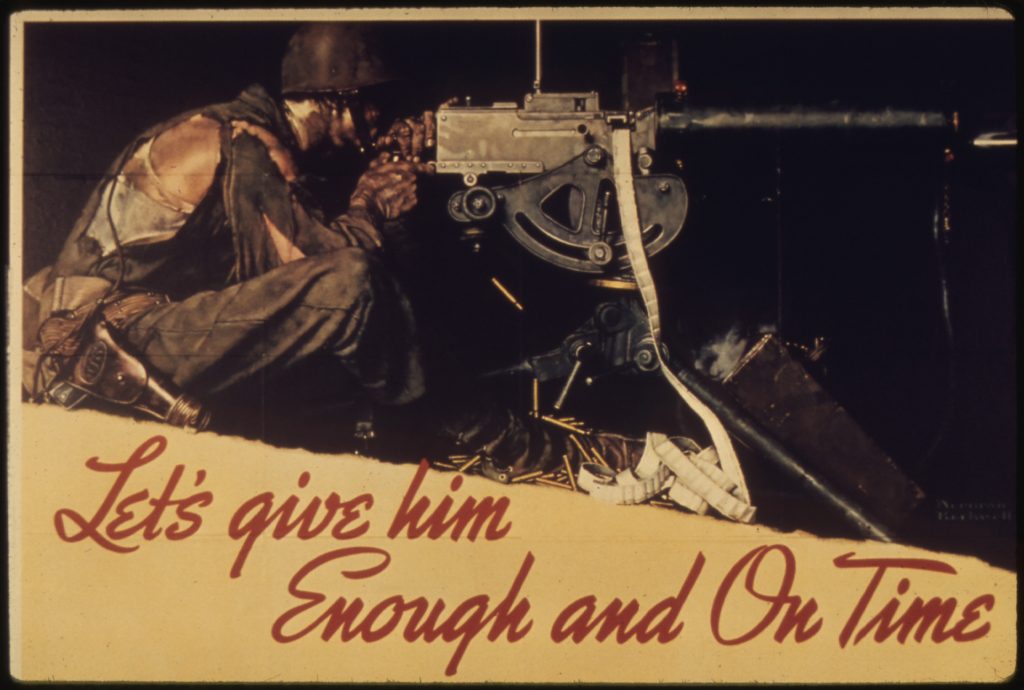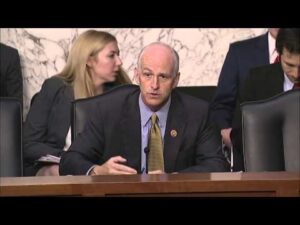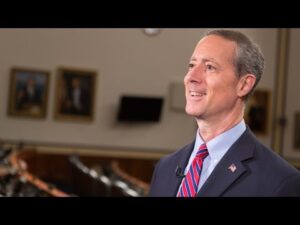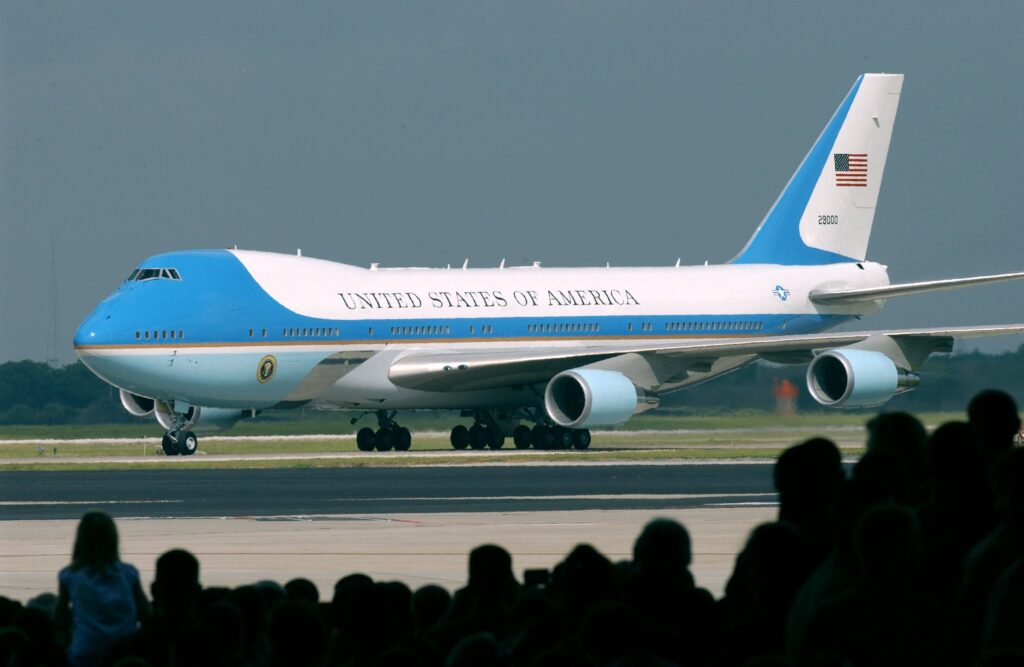
World War II propaganda poster by Norman Rockwell, displayed by House Armed Services’ ranking Republican Mac Thornberry during this morning’s budget debates.
UPDATED WASHINGTON: It took just minutes this morning at the House Armed Services Committee for the opening encomiums to bipartisanship to give way to polite but partisan debate over the bottom-line issue of how much the US should spend on defense.
[Click here for our forecast of what the final budget number will be.]
Democratic chairman Adam Smith didn’t even make it through his pro forma reading of the rules governing the annual mark-up of the defense policy bill before his predecessor, Republican Mac Thornberry, objected. Why? Those rules, while the very same ones Thornberry had enforced as chairman, would now hinder his amendment to add $17 billion to the Democrat-endorsed defense budget by requiring him find cuts elsewhere — aka “offsets” — to pay for it.

Rep. Adam Smith
“It is the practice of this committee,” Smith read, “that amendments involving additional spending must identify suitable offsets….”
“Mr. Chairman,” Thornberry interrupted, “after consulting carefully with the parliamentarians, I must object to the last sentence that you read… because they tell us if we don’t object now, there is an implied unanimous consent.”
“Correct,” Smith said.
“There is not agreement on that this year,” Thornberry continued, the generally congenial Texan sounding almost apologetic. “At this point it is essential that I lodge an objection and make it clear there is not unanimous consent for the limitation on amendments….”
“Fair enough,” Smith said. “[But] basically this is the argument over $750 billion vs. $733 billion, which we will have. We have had disagreements in the past on what the topline number is. We have never in my time on this committee allowed amendments that did not have suitable offsets.”
“I just want to make it clear [for] the record,” Thornberry said.

Rep. Mac Thornberry
UPDATE Thornberry’s office issued a statement early this afternoon promising that there would be a vote on his amendment to add $17 billion, even if Smith rules it’s out of order for lack of offsets.
“We understand that many Majority Members believe that Chairman Smith will simply rule the amendment out of order without Majority Members having to vote on the amendment,” the statement ran. “When he was asked about this issue, Rep Thornberry said: ‘There will be a vote on it- one way or another.’”
UPDATE 2 Thornberry ultimately got his vote, but with every Democrat but one (Rep. Elaine Luria) voting against the additional $17 billion, it was defeated. That’s no surprise — but it’s hardly the end of the story. The Republican-led Senate has stuck with the administration’s $750 billion figure, and odds are the Democrats will have to compromise in conference, or even earlier, on the House floor. UPDATE ENDS

Air Force One
Dickens, Shakespeare, & Air Force One
After the initial procedural snarl, the committee moved on to more pro forma matters — for a while. But even the routine remarks by subcommittee leaders touting their particular pieces of the bill consistently included Democrats defending the $733 figure and Republicans attacking it. Within in an hour, the debate reached a pitch where GOP Rep. Rob Wittman was decrying the “significant carnage” caused by cutting $17 billion from President Trump’s request and reading into the record the opening lines of Tale of Two Cities:
“It was the best of times, it was the worst of times, it was the age of wisdom, it was the age of foolishness, it was the epoch of belief, it was the epoch of incredulity, it was the season of Light, it was the season of Darkness, it was the spring of hope, it was the winter of despair….”
“Well, that certainly was more dramatic than the previous statements,” the eternally snarky Smith said to general laughter. But cutting $17 billion from $750 — 2.3 percent — is not a matter for such rhetoric, he argued, unconsciously slipping from Dickens into Shakespeare’s Richard III: “It’s not any winter of discontent or a dramatic cut.”

Rep. Rob Wittman
In fact, Smith argued, since the $733 billion was the original figure for 2020 in the Defense Department’s long-term budget plans, based on intensive study, “if you simply give them anther $17 billion that has not gone through the rigorous analysis that the $733 billion went through, [there’s a risk] that money will simply be wasted. The Pentagon will not be efficient.”
Wait a minute, Thornberry replied. $750 billion wasn’t pulled out of thin air or anyone’s orifices: “I was personally present in the Oval Office,” he recalled, with Senate Armed Services chairman Jim Inhofe, when the figure was endorsed by not only President Trump and Vice President Pence but then-Secretary of Defense Jim Mattis. It simply reflects, with rounding, the minimum three percent real growth over inflation that the Pentagon has long argued is essential to sustain readiness and modernization to keep up with Russian and Chinese build-ups. And the additional $17 billion goes to a list of clearly itemized needs from either the president’s budget request or the armed service’s official Unfunded Requirements, not an ill-thought-through grab-bag.
The idea that “if we cut money, they get more efficient…. has been empirically proven not to be the case,” Thornberry said. That’s ironic given the arguments Republicans often make about federal funding for every agency except the Pentagon.
A general debate over budget followed, but soon the committee got back to its regular — and largely non-partisan — business. Armed Services’ Republicans and Democrats could unite, for instance, in their discontent (wintery or otherwise) that another committee, Intelligence, had refused to waive jurisdiction and allow them to rename the Undersecretary of Defense for Intelligence as Undersecretary for Intelligence and Security, reflecting the office’s new roles in issues such as security clearances.
The only other partisan brew-up so far: painting President Trump’s Air Force One. Except that it’s not just the paint, and it’s not really going to be Trump’s plane.
The two heavily modified Boeing 747s now serving as presidential transports are getting old — one’s been flying since 1990 — and badly need to be replaced, members from both parties agreed. The Democrats even acknowledged that President Trump had negotiated a good deal with Boeing for two new 747s at $3.9 billion, a $1.4 billion savings.
The disagreement comes about a clause for costs “over and above” those included in the $3.9 billion contract. Republicans defended it as essential flexibility to upgrade the aircrafts’ high-tech communications and self-defense systems, but Democrats warned it could be a backdoor to Trumpian excess — “gold- plated” fixtures or a new star-spangled paint scheme that broke with the “iconic” blue-and-white look known around the world. Republicans countered that Democrats were attempting to micromanage the president, while Rep. Smith wearily noted the new planes wouldn’t enter service until late 2024 or early 2025, meaning Trump would hardly get to fly on them even if he won a second term.
The debate escalated to the first formal roll-call vote of the day (and the only one at this writing, just before 2pm), as opposed to the standard unanimous approval of items by voice. The committee voted 31 to 26 for an amendment restricting “over and above” expenses for “interior, paint, and fixtures.” The partisan breakdown on the committee? 31 Democrats, 26 Republicans.
It’ll be a long day.
UPDATE 3 The full bill — allocating $733 billion — passed the committee 33 to 24, with just two Republicans voting in favor, in the early hours of the morning. Next step: trying to pass the full House, with a flurry of amendments sure to spark more partisan debate.
Major trends and takeaways from the Defense Department’s Unfunded Priority Lists
Mark Cancian and Chris Park of CSIS break down what is in this year’s unfunded priority lists and what they say about the state of the US military.


























